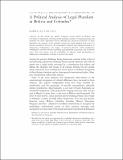|
Reseña:
|
In this article the author compares recent efforts in Bolivia and Colombia to implement constitutionally mandated regimes of legal pluralism, and identifies the most important factors affecting the practical realisation of legal pluralism: the capacity of the political system, the legal tradition and society to tolerate normative diversity; the geographic isolation and cultural alienation of indigenous communities; the degree of internal division within indigenous communities and movements regarding legal pluralism in general, and in specific cases, that have arisen, and the availability of effective legal mechanisms to indigenous communities seeking to protect this right. |



